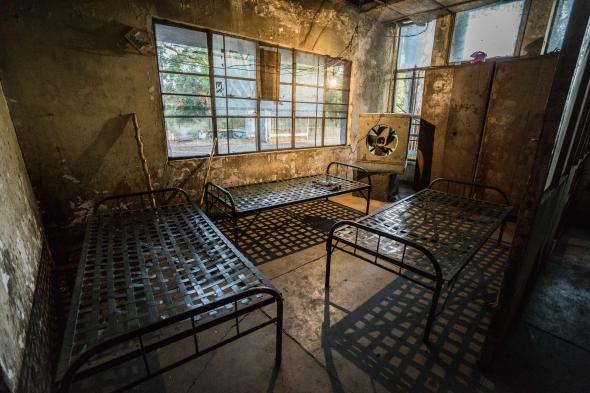The coronavirus and memories of the end of the world
 Abandoned Union Carbide Factory, Bhopal | 2014 | Giles Clarke
Abandoned Union Carbide Factory, Bhopal | 2014 | Giles Clarke
In a text in which Manuel António Pina dwells on the winding paths of memory, he scolds the mirror: “I should remember my memories, but I remember other people’s memories” (Pina: 1999). We are fated to divide the past between the memories that belong to us and the memories of others, those that tell us very little or nothing. The imperative rehearsed by the poet would be entirely absurd if we were to accept that there is a rigid boundary between “my memories” and “other people’s memories”, as if the body-memory only encompasses what happens to it first hand, in a strict phenomenology of the recallable. However, the truth is that the memories of the lives of others are a fundamental part of our past, of “my memories”: what we have heard about since childhood, the history we studied in school books, our own permeability that allows us to make the past of those close to us intimate. Therefore, the real barrier is less dictated by the movements of our body-memory than by the structures of meaning, which define the immunity or porosity of the memories of other bodies-memory.
These ramblings come about the overwhelming spread of COVID-19, a disease caused by the infection by the SARS-CoV-2 coronavirus. The severity of the disaster and the uncertainty regarding the impact of COVID-19 on public health worldwide gives rise to an unprecedented suspension of the order of things. This is particularly due to the impact of diseases, deaths, states of emergency, quarantines, confinements, closing of borders, minimal services and maximum alerts, all in a context where, as a spokesman for the World Health Organization said, the best is to prepare for the worst. The extremely high rate of contagion of the SARS-CoV-2 virus corresponds to a global sharing of vulnerability during a disaster as we may not have known since the specter of nuclear war in the 20th century.
Many disasters of the past, loaded with what Veena Das refers to as “world-annihilating violence” (Das, 2007: 8), were confined to the local worlds of the memories of those who survived them. I speak, for example, of the survivors of the Bhopal disaster in India. After midnight on 3 December 1984, a reaction in one of the (E-610) tanks in a factory belonging to Union Carbide India Limited led to the release of a cloud of toxic gases which spread to the surrounding areas via wind. The residents in the affected areas, sensing something in the air similar to pepper, which made their eyes burn and caused serious breathing difficulties, began to flee in panic seeking refuge from the invisible gas cloud and hoping to reach the hospital. It was a scenario of frantic, half-dressed people who had just woken up, and families calling for each other and getting lost in the midst of the confusion. Dawn broke on the 3th of December to an apocalyptic scene of people temporarily blinded, vomiting, coughing and breathing in agony, masses of people and animals trampled underfoot on the streets and others seeking treatment at the Hamidia hospital, as well as piles of corpses accumulating hourly.
The accident at the Union Carbide India Limited factory, a subsidiary of the American company Union Carbide Corporation, located in Bhopal, India, would trigger the biggest industrial disaster in history. It is estimated that thousands of people died between that night and the weeks after the accident, twenty-five thousand in subsequent years, and that there are currently more than one hundred thousand people with important permanent sequelae.
Between December 2013 and February 2014, I carried out field work in the city of Bhopal, in close collaboration with the Sambhavna Trust (ST), a non-governmental organisation (NGO) whose clinic, situated in the vicinity of the factory where the disaster took place, still provides health care for the survivors of Bhopal’s disaster. During the time in which I lived in Bhopal, I stayed at the ST clinic where, from Monday to Saturday, 180 survivors received medical care. While gathering life stories, and interviewing health professionals and activists, I was able to witness the lasting impact of “that night”, the night of the loss of family members, neighbours and other loved ones, which in so many times established a life of physical pain, illness and traumatic memories (Martins, 2019). This immersion will have allowed those memories of others to question me deeply, however, not to the point of making them mine. Although the pain surrounding this loss does not belong to me, I will never be able to live away from the echo of those memories, the echo of a disaster endlessly recapitulated in successive presents, in a distant city in India.
The feeling of shared vulnerability that we are currently experiencing due to the crisis started by the coronavirus interrogates us regarding the limits of our memory to democratize our past, decolonizing the racial, colonial and patriarchal hierarchies that define what is alien. In “my memory” I should remember countless stories of the end of the world, stories long witnessed by those for whom COVID-19 is just another episode of a continued exposure to the uneven distribution of precariousness.
Works cited
Das, Veena (2007), Life and Words: Violence and the Descent into the Ordinary. Berkeley: University of California Press Martins, Bruno Sena (2019), “Direitos Humanos e a memória abissal: o Desastre de Bhopal”, in Boaventura de Sousa Santos; Bruno Sena Martins (orgs.), O Pluriverso dos Direitos Humanos: A diversidade das lutas pela dignidade. Coimbra: Almedina. Pina, Manuel António (1999), “Lembranças”, Nenhuma Palavra, nenhuma lembrança. Lisboa: Assírio & Alvim.
__________
MEMOIRS is funded by the European Research Council (ERC) under the European Union’s Horizon 2020 research and innovation programme (no. 648624) and is hosted at the Centre for Social Studies (CES), University of Coimbra.